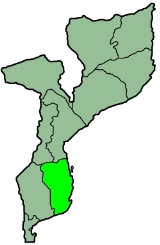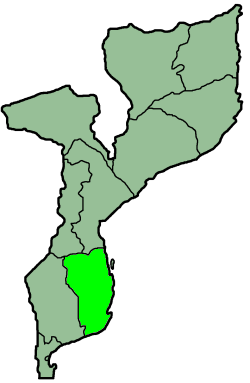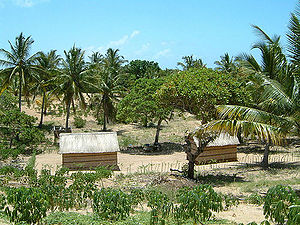
Inhambane Province
Encyclopedia


Provinces of Mozambique
||Mozambique is divided into 10 provinces and 1 capital city with provincial status:#Cabo Delgado Province#Gaza Province#Inhambane Province#Manica Province#Maputo City#Maputo Province#Nampula Province#Niassa Province...
of Mozambique
Mozambique
Mozambique, officially the Republic of Mozambique , is a country in southeastern Africa bordered by the Indian Ocean to the east, Tanzania to the north, Malawi and Zambia to the northwest, Zimbabwe to the west and Swaziland and South Africa to the southwest...
located on the coast in the southern part of the country. It has an area of 68,615 km² and a population of 1.412.349 (2006). The provincial capital is also called Inhambane.
The climate is tropical throughout, more humid along the coast and dryer inland. The coast has a number of mangrove
Mangrove
Mangroves are various kinds of trees up to medium height and shrubs that grow in saline coastal sediment habitats in the tropics and subtropics – mainly between latitudes N and S...
swamps.
The town of Inhambane existed in the 10th century, and was the southernmost port used by Arabs for slave
Slavery
Slavery is a system under which people are treated as property to be bought and sold, and are forced to work. Slaves can be held against their will from the time of their capture, purchase or birth, and deprived of the right to leave, to refuse to work, or to demand compensation...
trading. The region was visited by Vasco da Gama
Vasco da Gama
Vasco da Gama, 1st Count of Vidigueira was a Portuguese explorer, one of the most successful in the Age of Discovery and the commander of the first ships to sail directly from Europe to India...
in 1498, who claimed Inhambane Bay for Portugal
Portugal
Portugal , officially the Portuguese Republic is a country situated in southwestern Europe on the Iberian Peninsula. Portugal is the westernmost country of Europe, and is bordered by the Atlantic Ocean to the West and South and by Spain to the North and East. The Atlantic archipelagos of the...
. The Portuguese established a trading post at Inhambane in 1534.
The province is the second largest grower of cashew
Cashew
The cashew is a tree in the family Anacardiaceae. Its English name derives from the Portuguese name for the fruit of the cashew tree, caju, which in turn derives from the indigenous Tupi name, acajú. It is now widely grown in tropical climates for its cashew nuts and cashew apples.-Etymology:The...
s (after Nampula
Nampula
Nampula is the capital city of Nampula Province in Mozambique.It has a population of 471,717 making it the third largest city in Mozambique after Maputo and Beira. It is home to the Mozambique National Ethnographic Museum, several markets, cathedrals and mosques.It is also the center of business...
), and also produces coconut
Coconut
The coconut palm, Cocos nucifera, is a member of the family Arecaceae . It is the only accepted species in the genus Cocos. The term coconut can refer to the entire coconut palm, the seed, or the fruit, which is not a botanical nut. The spelling cocoanut is an old-fashioned form of the word...
and citrus
Citrus
Citrus is a common term and genus of flowering plants in the rue family, Rutaceae. Citrus is believed to have originated in the part of Southeast Asia bordered by Northeastern India, Myanmar and the Yunnan province of China...
fruit (inspiring Mozambique's most famous poet Craveirinha to write of "The Tasty Tangerines of Inhambane"). The long coastline supports much fishing
Fishing
Fishing is the activity of trying to catch wild fish. Fish are normally caught in the wild. Techniques for catching fish include hand gathering, spearing, netting, angling and trapping....
. The Inhambane Bay area is of some interest for tourism
Tourism
Tourism is travel for recreational, leisure or business purposes. The World Tourism Organization defines tourists as people "traveling to and staying in places outside their usual environment for not more than one consecutive year for leisure, business and other purposes".Tourism has become a...
, with a number of beaches, and one of the last remaining populations of dugong
Dugong
The dugong is a large marine mammal which, together with the manatees, is one of four living species of the order Sirenia. It is the only living representative of the once-diverse family Dugongidae; its closest modern relative, Steller's sea cow , was hunted to extinction in the 18th century...
in Mozambique.
Districts of Inhambane Province
- Funhalouro DistrictFunhalouro DistrictFunhalouro District is a district of Inhambane Province in south-east Mozambique. Its principal town is Funhalouro. It has a population of 37.925 as of 2007.-Further reading:*...
- Govuro DistrictGovuro DistrictGovuro District is a district of Inhambane Province in south-east Mozambique. Its principal town is Govuro. It has a population of 34.809 as of 2007.-Further reading:*...
- Homoine DistrictHomoine DistrictHomoine District is a district of Inhambane Province in south-east Mozambique. Its principal town is Homoine. It has a population of 107.475 as of 2007.-Further reading:*...
- Jangamo DistrictJangamo DistrictJangamo District is a district of Inhambane Province in south-east Mozambique. Its principal town is Jangamo. It has a population of 93.681 as of 2007.-Further reading:* -References:...
- Inharrime DistrictInharrime DistrictInharrime District is a district of Inhambane Province in south-east Mozambique. Its principal town is Inharrime. It has a population of 97.471 as of 2007.-Further reading:*...
- Inhassoro DistrictInhassoro DistrictInhassoro District is a district of Inhambane Province in south-east Mozambique. It has a population of 48,537 as of 2007.-Further reading:*...
- Mabote DistrictMabote DistrictMabote District is a district of Inhambane Province in south-east Mozambique. Its principal town is Mabote. It has a population of 45101 as of 2007.-Further reading:*...
- Massinga DistrictMassinga DistrictMassinga District is a district of Inhambane Province in south-east Mozambique. Its principal town is Massinga. It has a population of 184.531 as of 2007.-Further reading:*...
- Morrumbene DistrictMorrumbene DistrictMorrumbene District is a district of Inhambane Province in south-east Mozambique. Its principal town is Morrumbene. It has a population of 124.471 as of 2007.-Further reading:*...
- Panda DistrictPanda DistrictPanda District is a district of Inhambane Province in south-east Mozambique. Its principal town is Panda. It has a population of 47.946 as of 2007.-Further reading:*...
- Vilankulo District
- Zavala DistrictZavala DistrictZavala District is a district of Inhambane Province in south-east Mozambique. Its principal town is Zavala. It has a population of 139.616 as of 2007.-Further reading:*...
Cities of Inhambane Province
- InhambaneInhambaneInhambane, Terra de Boa Gente is a city located in southern Mozambique, lying on Inhambane Bay, 470 km northeast of Maputo. It is the capital of the Inhambane Province and according to the 2008 census has a population of 65,837, growing from the 1997 census of 54,157...
provincial capital - MaxixeMaxixe, MozambiqueMaxixe is the largest city and economic capital of the province of Inhambane, Mozambique. It is situated on the Indian Ocean at 23°52′S 35°23′E just south of the Tropic of Capricorn, in a bay opposite historic Inhambane City which can be reached by local ferries...
largest population, and the province's economic capital
Stamps and postal history of Inhambane
As with several other districts of colonial Mozambique, the Portuguese government printed postage stampPostage stamp
A postage stamp is a small piece of paper that is purchased and displayed on an item of mail as evidence of payment of postage. Typically, stamps are made from special paper, with a national designation and denomination on the face, and a gum adhesive on the reverse side...
s specifically for Inhambane for several years. The first issue was for the 700th anniversary of St. Anthony of Padua
Anthony of Padua
Anthony of Padua or Anthony of Lisbon, O.F.M., was a Portuguese Catholic priest and friar of the Franciscan Order. Though he died in Padua, Italy, he was born to a wealthy family in Lisbon, Portugal, which is where he was raised...
in 1895, the stamps being those of Mozambique overprint
Overprint
An overprint is an additional layer of text or graphics added to the face of a postage stamp or banknote after it has been printed. Post offices most often use overprints for internal administrative purposes such as accounting but they are also employed in public mail...
ed "CENTENARIO / DE / S. ANTONIO / Inhambane / MDCCCXCV". This was followed up in 1903 by a regular set featuring a portrait of King Carlos and inscribed "IMHAMBANE". Between 1911 and 1917, revolution in Portugal resulted in a variety of "REPUBLICA" overprints. Subsequently Inhambane reverted to the use of the stamps of Mozambique.
Culture
Inhambane is famous for its music, in particular the timbila (xylophone ensemble) of the ChopiChopi
The Chopi are an ethnic group of Mozambique. They have traditionally lived primarily in the Zavala region of southern Mozambique, in the Inhambane Province. They traditionally lived a life of subsistence agriculture, traditionally living a rural existence, although many were displaced or killed in...
ethnic group.

